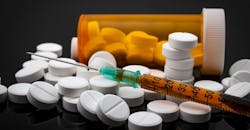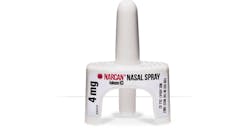Overcoming Overdoses: Keeping Narcan on Factory Floor
With the opioid epidemic paving the way for unintentional poisonings to remain the number one cause of death in the United States, employers, legislators, organizations and law enforcement officials continually are looking for ways to stop the spread.
The issue is a delicate problem to face. Despite drug-free workplace policies, workers still are falling victim to substance abuse, whether they are legally or illegally obtaining opioids. And for workplace safety, managing employees who are addicted or in recovery could be the difference in reducing injury rates and costs.
The auto industry in particular has been hit hard, with Michigan and Ohio in particular having several auto manufacturing plants and a statistically significant increase in drug overdoses since 2015, reports Automotive News.
"Assembly work is very boring, very tedious," said Kevin Bush, an employee representative at Ford's Louisville Assembly Plant, to Automotive News. "That kind of work causes many aches and pains in their body. Maybe they have a pain and the doctor prescribes opioids. And over a period of time the use of that creates a high tolerance and an addiction. And one thing leads to another and it gets worse."
Overall, the CDC Foundation estimates lost productivity for people with opioid use disorder totaled $20.4 billion in 2013. So, what can be done? In April 2017, legislators in Ohio approved a bill which gave employers permission to administer naloxone, or Narcan to save worker lives. Unfortunately, with today's epidemic, having Narcan on-hand should be as common as providing first aid such as bandages.
The Lake County (Ohio) Health District described the contents of the bill, which provided a solid outline to how Narcan can be safely administered:
- A description of the clinical pharmacology of naloxone
- Precautions and contraindications concerning the administration of naloxone
- Any limitations concerning the individuals to whom naloxone may be administered
- The naloxone dosage that may be administered and any variation in the dosage based on circumstances specified in the protocol
- Labeling, storage, recordkeeping, and administrative requirements
- Training requirements that must be met before an individual can be authorized to administer naloxone
The sad fact is opioid abuse impacts everyone, and it is a lifelong battle for those who become addicted. After six years of sobriety, Demi Levato overdosed on opioids on July 24, 2018. She was given Narcan to revive her before being transported to the hospital.
Following media reports about the singer, National Safety Council (NSC) released the following statement:
Pop star Demi Lovato's reported overdose is a painful reminder that our nation's drug epidemic hurts both those closest to us and those we admire from afar. However, her reported revival with Narcan, an overdose reversal medicine, tells us that substance misuse stories can end with hope rather than tragedy.
While Ms. Lovato was reportedly given Narcan by emergency responders, our law enforcement and emergency professionals are not the only people who can administer it. The National Safety Council echoes Surgeon General Jerome Adams in his call for increased access to naloxone, understanding that anyone can administer it without fear of an adverse outcome. It poses no threat to someone who might not be overdosing. The only thing naloxone will do is save a life.There is no silver bullet for ending our country's opioid crisis. But naloxone provides a silver lining. If you or someone you love uses opioids, NSC urges you to keep this medicine on hand and be prepared to use it if needed.
As safety professionals, judgement about how the person came to be addicted always should be left to the wayside when a worker's life is top priority. Whether they're homeless, a pop star or a construction worker, they're still human beings. So, providing the medicine and the training needed to reduce the effects of an overdose is just one more step to a positive workplace culture along with the support needed to overcome the epidemic.
NSC President and CEO Deborah A.P. Hersman said it best: "The most important thing about this crisis is not the statistics, but the faces. The data speak to our head but the individual stories speak to our hearts."

